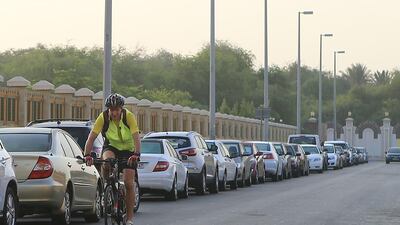It's common knowledge that the UAE is not particularly safe for cyclists, who must navigate dangerous roads filled with speeding and erratic drivers. But, as The National reported yesterday, cycling has been growing in popularity despite the risks.
As a sport, it has gone from strength to strength as new, dedicated cycle tracks have opened near Dubai and Abu Dhabi. A growing number of mountain bikers now also take to Ras Al Khaimah’s hills every weekend. Cycling has become the preferred mode of transport for an increasing number of people. Many of those who had not ridden a bike for years have taken up the habit recently. And for good reason.
Bicycle riding is healthy, cheap compared to driving a car, environmentally friendly and, for most people, a great deal of fun. In a country like the UAE, which has one of the highest rates of obesity and diabetes in the world, cycling can be an ideal form of exercise. Research suggest that people who commute by bicycle are more likely to be successful at work as they are fitter, more alert and take fewer sick days.
But as Klara Zakis, a former Dubai resident, told this newspaper, she refused to cycle from her home in Dubai Marina to her office in Media City due to safety concerns. Her fears were not unfounded. Last year triathlete Roy Nasr was killed during an early morning training ride in Dubai, while Mehdi Karasane died after being knocked down on the road between Abu Dhabi and Dubai. There have been several other tragic accidents. That’s why the Walking and Cycling Master Plan for Abu Dhabi, released in April, is so important. According to the plan, bike lanes in the emirate will double by 2020. However, it’s important that these bike lanes provide sufficient physical separation from other traffic.
Some cities, such as London, have invested heavily in cycling infrastructure, as a result of which the rise in the number of people cycling in the city has grown 117 per cent since 2000.
But investment alone is not enough. To make the UAE a truly bike-friendly country, it is also necessary to change the driving culture, so that people can ride safely, enjoyably and easily in an environment that embraces cycling – an environment for which The National has consistently campaigned. After all, a more bike-friendly country will be a better country all around.

